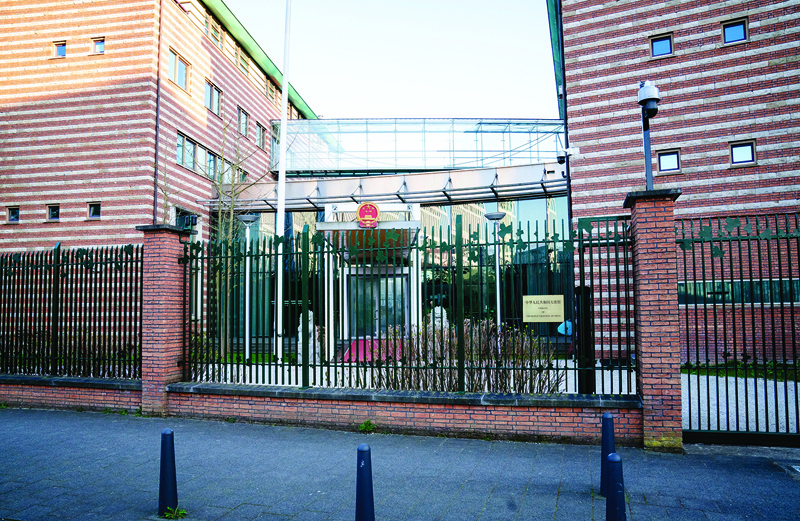 THE HAGUE: The entrance of the China embassy in the Netherlands in The Hague as the Dutch government summoned the Chinese ambassador after a lawmaker was among 10 Europeans sanctioned by Beijing in a row with the EU over the Uighur crackdown, the foreign ministry said. – AFP
THE HAGUE: The entrance of the China embassy in the Netherlands in The Hague as the Dutch government summoned the Chinese ambassador after a lawmaker was among 10 Europeans sanctioned by Beijing in a row with the EU over the Uighur crackdown, the foreign ministry said. – AFP
BEIJING: Beijing accused the EU of "hypocrisy" yesterday after the two sides summoned each other's envoys in an escalating row over the treatment of China's Uyghurs. France, Germany and other EU nations called in Chinese ambassadors to protest against sanctions imposed by Beijing targeting their citizens, including five members of the European Parliament as well as two EU bodies and two think-tanks.
Meanwhile, the US Treasury Department placed sanctions on two senior Chinese officials for what it called "serious human rights abuses" against Uighurs and other minorities in the country's Xinjiang region. "Chinese authorities will continue to face consequences as long as atrocities occur in Xinjiang," said Andrea Gacki, the Treasury official overseeing the sanctions program.
The sanctions targeted Wang Junzheng, the secretary of the Chinese Communist Party committee of the Xinjiang Production and Construction Corps (XPCC), and Chen Mingguo, director of the Xinjiang Public Security Bureau. The Treasury action was part of a coordinated effort by the European Union, Britain, Canada and the United States to raise the pressure on Beijing for putting more than one million Xinjiang citizens, mostly Muslim Uighurs, in prison camps, and using many in forced labor programs.
The sanctions were a tit-for-tat response after the EU, Britain and Canada blacklisted four former and current officials in China's Xinjiang region. China called in the EU and British envoys in Beijing over the coordinated move. Rights groups say at least one million Uighurs and other mostly Muslim minorities have been incarcerated in camps in Xinjiang, where authorities are also accused of forcibly sterilizing women and imposing forced labor.
China has strongly denied the allegations, saying training programs, work schemes and better education have helped stamp out extremism in the northwest region and raise income. "The EU only allows itself to arbitrarily smear and attack others, and even arbitrarily imposes sanctions based on false information and lies, but does not allow the Chinese to talk back or fight back," said foreign ministry spokeswoman Hua Chunying at a press briefing.
"This in itself is double standards, a manifestation of bullying and hypocrisy." Washington, which had already imposed sanctions on two of the Chinese officials in July 2020, extended them to two others. It is leading a drive to form a united front against China on issues from rights abuses in Xinjiang and Hong Kong to Beijing's claims over the South China Sea.
China had until recently enjoyed relatively cordial relations with the EU, which has been muted over alleged rights abuses as it hunts a trade pact with the world's second largest economy. The European Union and China in December approved "in principle" a major investment pact after seven years of painstaking negotiations-but it is still expected to take months to be finalized and fully ratified as a legal text.
Hua said China did "not accept the unreasonable practice of some European countries in summoning Chinese ambassadors." The tensions come as the EU seeks to formulate a strategy on China at a time when tensions between Beijing and Washington are emerging as the world's number one geopolitical issue. Beijing also released a report yesterday detailing what it said were human rights abuses committed in the US, citing gun crime, violence towards ethnic minorities and the way Washington has tackled the COVID-19 outbreak.
"The United States, which has always considered itself an exception and superior, saw its own epidemic situation go out of control, accompanied by political disorder, inter-ethnic conflicts, and social division," the report claimed. - AFP




